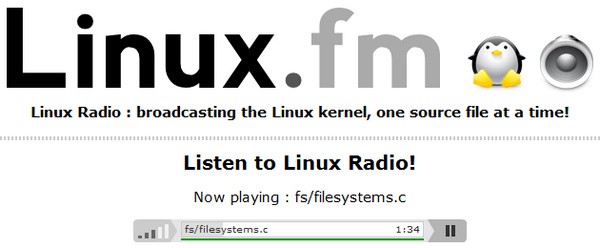Kernel radio offers you a reading of the source code of the stable Linux kernel, file after file. This stream is a tribute and a reincarnation of the late Linux.fm project which has long proposed the same reading.
The Linux kernel is a major technopolitical issue, most major digital companies contribute to it, its development concentrates many interests and influences, it is one of the first guardians of the security and integrity of our connected devices. The reading is carried out by a synthetic voice, the technical description of the device is detailed below

The workflow : git pull of the linux stable kernel > bash script that launch the streaming fed by a loop / virtual soundcard > bash script that find recursively all the files of the kernel source and send each one to a text to speach software that says the text in the linked loop / virtual soundcard.
https://git.kernel.org/pub/scm/linux/kernel/git/stable/
Install a dummy sound card and a loop virtual soundcard with alsa
sudo apt install alsa-utils sox oggwfd espeak mbrola-us1 mbrola
sudo modprobe snd-dummy
sudo modprobe snd-aloopIt gives several input / output, to see them, the user muts be in the audio group
sudo usermod -a -G audio YourUserThen log-out and in and list devices for playing or recording
aplay -l
**** List of PLAYBACK Hardware Devices ****
card 0: Dummy [Dummy], device 0: Dummy PCM [Dummy PCM]
Subdevices: 7/8
Subdevice #0: subdevice #0
Subdevice #1: subdevice #1
Subdevice #2: subdevice #2
Subdevice #3: subdevice #3
Subdevice #4: subdevice #4
Subdevice #5: subdevice #5
Subdevice #6: subdevice #6
Subdevice #7: subdevice #7
card 1: Loopback [Loopback], device 0: Loopback PCM [Loopback PCM]
Subdevices: 7/8
Subdevice #0: subdevice #0
Subdevice #1: subdevice #1
Subdevice #2: subdevice #2
Subdevice #3: subdevice #3
Subdevice #4: subdevice #4
Subdevice #5: subdevice #5
Subdevice #6: subdevice #6
Subdevice #7: subdevice #7
card 1: Loopback [Loopback], device 1: Loopback PCM [Loopback PCM]
Subdevices: 8/8
Subdevice #0: subdevice #0
Subdevice #1: subdevice #1
Subdevice #2: subdevice #2
Subdevice #3: subdevice #3
Subdevice #4: subdevice #4
Subdevice #5: subdevice #5
Subdevice #6: subdevice #6
Subdevice #7: subdevice #7For recording :
arecord -l
**** List of CAPTURE Hardware Devices ****
card 0: Dummy [Dummy], device 0: Dummy PCM [Dummy PCM]
Subdevices: 8/8
Subdevice #0: subdevice #0
Subdevice #1: subdevice #1
Subdevice #2: subdevice #2
Subdevice #3: subdevice #3
Subdevice #4: subdevice #4
Subdevice #5: subdevice #5
Subdevice #6: subdevice #6
Subdevice #7: subdevice #7
card 1: Loopback [Loopback], device 0: Loopback PCM [Loopback PCM]
Subdevices: 8/8
Subdevice #0: subdevice #0
Subdevice #1: subdevice #1
Subdevice #2: subdevice #2
Subdevice #3: subdevice #3
Subdevice #4: subdevice #4
Subdevice #5: subdevice #5
Subdevice #6: subdevice #6
Subdevice #7: subdevice #7
card 1: Loopback [Loopback], device 1: Loopback PCM [Loopback PCM]
Subdevices: 7/8
Subdevice #0: subdevice #0
Subdevice #1: subdevice #1
Subdevice #2: subdevice #2
Subdevice #3: subdevice #3
Subdevice #4: subdevice #4
Subdevice #5: subdevice #5
Subdevice #6: subdevice #6
Subdevice #7: subdevice #7To activate on start-up, add the line to the file :
sudo nano /etc/modules-load.d/modules.conf
# /etc/modules: kernel modules to load at boot time.
#
# This file contains the names of kernel modules that should be loaded
# at boot time, one per line. Lines beginning with "#" are ignored
snd-dummy
snd-aloop
systemctl restart systemd-modules-load.serviceA good tech documentation :
launchkernelfm.sh
#!/bin/bash
######################################################################
# update the kernel source & launch the find process and the stream #
######################################################################
cd /data/pnode/algo/linux-stable
git pull
cd /data/pnode/algo/kernel-radio
./launchkernelfind.sh &
sleep 1
while true
do
arecord -c 2 -f cd -r 48000 -D hw:1,1,0 | sox -t raw --ignore-length -r 44100 -e signed-integer -b 16 -c 2 - -t ogg -C 5 - |oggfwd -d 'Stable Linux kernel source code lecture' -g Generative -n Kernel-radio -u https://git.kernel.org/pub/scm/linux/kernel/git/stable/ 212.83.128.6 80 ****** kernel-lecture.ogg
donelaunchkernelfind.sh
#!/bin/bash
######################################################################
# find all files of the os and send 2 espeak one by one #
######################################################################
sleep 3
while true
do
find /data/pnode/algo/linux-stable -exec ./espeakernel.sh {} \;
done
espeakernel.sh
#!/bin/bash
##########################################################################
# speach sysnthesys of the filename and its content #
##########################################################################
# usage: ./espeakernel.sh PATH_TO_FILE ` #
##########################################################################
echo $(basename "$1") | espeak -a 90 -p 59 -s 140 -g 7 -v mb-us1 --stdin --stdout| sox -t raw --ignore-length -r 16000 -e signed-integer -b 16 -c 1 - -t wav - channels 2 rate -L -s 48000|aplay -c 2 -D hw:1,0,0
path=$(echo $1|cut -d'/' -f5-)
curl -k -X "GET" "http://212.83.128.6/admin/metadata?mount=/kernel-lecture.ogg&mode=updinfo&song="$path"" --user pnode:********
sleep 0.5
espeak -a 100 -p 59 -s 140 -g 7 -v mb-us1 -f "$1" --stdout| sox -t raw --ignore-length -r 16000 -e signed-integer -b 16 -c 1 - -t wav - channels 2 rate -L -s 48000|aplay -c 2 -D hw:1,0,0
exit 0
killkernelfm.sh
#!/bin/bash
######################################################################
# kill all the process #
######################################################################
pkill -f launchkernelfm.sh
pkill -f launchkernelfind.sh
pkill -f espeakernel.shCreate a systemd file to create a service :
sudo nano /lib/systemd/system/kernelradio.service
[Unit]
Description=Stable Linux kernel source code lecture
[Service]
Type=simple
#Type=forking
ExecStart=/data/pnode/algo/kernel-radio/launchkernelfm.sh
StandardOutput=null
Restart=always
RestartSec=1
ExecStop=/data/pnode/algo/kernel-radio/killkernelfm.sh
# Configures the time to wait before service is stopped forcefully.
TimeoutStopSec=30
[Install]
WantedBy=multi-user.target
Alias=kernelradio.service
Start the service and enable at start-up
sudo systemctl start kernelradio.service
sudo systemctl status kernelradio.service
sudo systemctl enable kernelradio.service